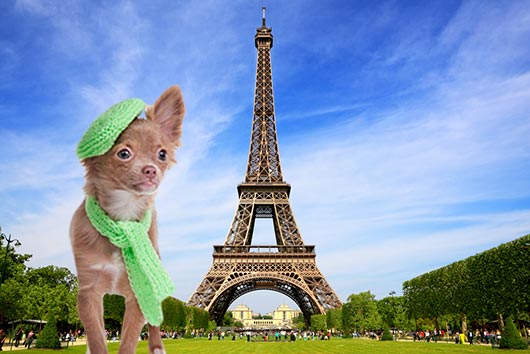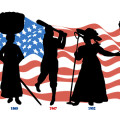
IF FRENCH IS THE LANGUAGE OF LOVE, WHAT’S THE LANGUAGE OF PARENTING?
I must confess that I’ve always been a bit of a Francophile. First of all, there’s the food. Pain au chocolat? Don’t mind if I do! Then there’s French cinema; I’m a sucker for anything starring Jeanne Moreau or directed by Jacques Tati. I’ve read all of the French Women Don’t Get Fat books by Mireille Guiliano. And let’s not forget the FASHION! Or the ART! Or the…parenting?
Earlier this year, former Wall Street Journal reporter Pamela Druckerman released her new book, Bringing Up Bebe: One American Mother Discovers the Wisdom of French Parenting. Now, since this is a book about French parenting written from an American’s point of view, I have to tell you that I was completely prepared to hate it. In truth, I’ve never been a fan of parenting books in general. I’m kind of a rebellious person and simply don’t like being told what to do. I especially don’t like it when it’s being done under the guise of “Tried and true wisdom from other cultures.” Maybe it comes from growing up as a Mexican-American who was always trying to bridge my two cultures, but I always end up feeling preached at and inadequate. So yes, I went into this book with a big chip on my shoulder. And no, I didn’t think I would like the book as much as I did. It turns out that it isn’t preachy at all, but entertaining and truly informative. I’ve even bought it for a couple of my friends who are moms!
Read Related: Mamiverse Talks With Pamela Druckman, Author of ‘Bringing Up Bebe’
STRANGE MOM IN A STRANGE LAND
Apart from Druckerman’s writing style, I think what really pulled me in was her struggle to find her place among the French parents she interacts with on a regular basis. I was surprised how much I could relate to her, there were many anecdotes that reminded me of experiences I’ve had raising bi-cultural kids here in the US. It also reminded me of stories my parents told me about their struggles to fit into “mainstream” American culture while their parents were viewed as “foreign” (though my grandparents were all native-born American citizens). In particular, Druckerman’s stories about her daughter’s clear French versus her own, heavily accented version, reminded me of speaking with my grandmother, who had a very heavy Mexican accent and how she sometimes said she was embarrassed not to speak English as well as her grandchildren. Druckerman’s daughter is American but, unlike her mom, she is also French.
FRENCH CHILDREN DON’T GET FAT OR MICRO-MANAGED
I was also surprised at how much I agreed with many of the French parenting practices Druckerman observes in the book. My husband and I don’t really believe in scheduling every hour of our kids’ lives. They don’t really do any “extracurricular” activities like sports, dance or music lessons. It’s not that we don’t believe in the value of these activities (I had piano lessons from the age of 7 through college and my husband was involved in theater from the age of 8 ) it’s just that we don’t want to push our children into doing them unless they really want to. So far they just haven’t wanted to. But if my daughter begged me to join the local soccer team or for guitar lessons of course I would do whatever I could to make that happen. My parents similarly didn’t push me and my sister to participate in anything, they only agreed let us do sports or music when we’d made a solid case for ourselves. Druckerman tells of French parents who do not overschedule their children partly because they believe children need unstructured play time, but also because chauffeuring kids hither and yon is extremely inconvenient for the parents. According to Druckerman, “One of the [French] moms…says she stopped sending her kids to tennis lessons, or anything else, because she found the lessons ‘constraining.’ ‘Constraining for whom?’ I ask. ‘Constraining for me,’ she says.” Though it’s hard for me to imagine many of my American mom friends saying such a thing, I think that my parents would have agreed with the French mom in the story—and I can’t say I completely disagree with this point of view. I have seen firsthand how my kids have benefited from having “free play” time, and I have to admit that driving them all over the county, especially on school nights, would seriously cut into my “me time”—however scarce it may be.
As I’ve said, there were many characteristics of French parenting in the book that reminded me of my own upbringing in a Mexican-American household. French parenting, according to Druckerman, is steeped in the 18th century philosophy of Jean-Jacques Rousseau, “He often seems to be describing the cadre—or frame…that parents are very strict about certain things but very relaxed about everything else.” Like the French, my family was extremely strict about children saying “Hello” and “Goodbye” to adults; it’s called manners. Also, adults did not prepare “special food” for the kids (like I do—chicken nuggets anyone?). We always ate what everyone else was eating and never asked for sugary cereal instead of chilaquiles for breakfast. Well, almost never. My family didn’t practice “helicopter parenting” and they didn’t micro-manage everything we kids did. In my memory, I had lots of time to play on my own or with my cousins. Sure, there were chores, but there was also plenty of free time, too. Discipline was strictly enforced, but only in the most important areas of my young life: school, church and respecting others. I really related to a quote from a French actor relayed by Druckerman, “Education is a firm cadre and inside is liberty.”
So it turns out I’m almost as much of a fan of French parenting as I am of French cinema! Maybe it’s time I introduced my kids to pain au chocolat….
Wishing you love with extra cheese—
Nacho Mama











